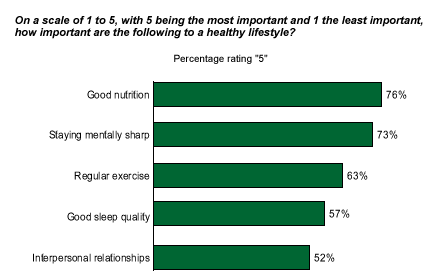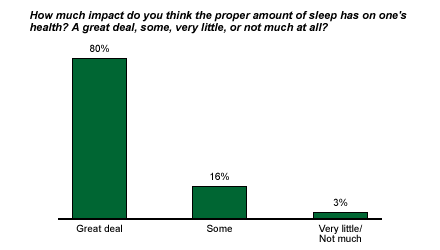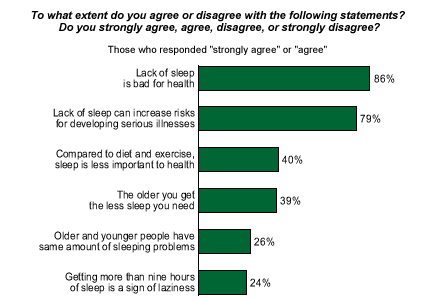This is the second article based on data from Gallup's recent study for the International Longevity Center of older Americans' attitudes toward sleep.
Medical studies consistently show that sleep is as important to good health as diet and exercise; we need it to survive and it affects our physical, mental, and emotional well-being. These days, however, many Americans live such busy lives that getting enough sleep gets bumped down their list of priorities. This may explain why, in a recent survey*, Americans aged 50 and older ranked the importance of good sleep quality fourth on a list of five factors that contribute to healthy living.
On a scale of 1 to 5, with "5" being the most important and "1" being the least important to a healthy lifestyle, older Americans are more likely to give "5s" to good nutrition, staying mentally sharp, and regular exercise than to good sleep quality. However, a majority gave a "5" to all these factors.

Sleep and Health
Even though respondents rate eating right, mental acuity, and exercise as more important than sleep to a healthy lifestyle, older adults do recognize that good sleep is important to one's health. Eighty percent of those surveyed say the proper amount of sleep affects one's health "a great deal."

"I love a good night's sleep," says Mary Wagner, a retired Pennsylvania homemaker who firmly believes that sleep affects both physical and mental health a great deal. Wagner, who sleeps about 10 hours each night, has enjoyed 88 years of good sleeping habits -- and good health. "A solid night's sleep makes me feel great in the morning," she says, "and eager for another busy day."
Women aged 50 and older are somewhat more likely than men in this age group to believe that the right amount of sleep greatly affects individual health, 84% vs. 75%, respectively. And older Americans who are already getting plenty of sleep -- eight hours or more every night -- are more likely to say sleep affects a person's health (86%) than are those who typically sleep fewer than six hours each night (73%).
Attitudes About Sleep
Further evidence that sleep is important to older adults emerges when they are asked whether they agree or disagree with specific statements regarding sleep. Roughly 8 in 10 older Americans agree or strongly agree that a lack of sleep is bad for your health and that it can increase risks for developing serious illnesses. Nevertheless, a substantial 4 in 10 agree that sleep is less important than diet and exercise to one's health.

Thirty-nine percent of respondents agree with the idea that the older you get, the less sleep you need. The majority of older Americans, 57%, disagree. The National Institute on Aging notes: "Sleep needs change over a person's lifetime. Children and adolescents need more sleep than adults. Interestingly, older adults need about the same amount of sleep as younger adults -- seven to nine hours of sleep per night."
About one in four respondents (26%) agree that older people and younger people have about the same amount of trouble sleeping, while 67% disagree. "Aging does impose sleep-related changes -- sleep becomes more fragmented, people can't fall asleep as quickly and they wake more often," says Dr. Carlos Fragoso, a well-known sleep specialist and Senior Geriatric Fellow at Yale. "Both deep sleep and REM sleep (dream sleep) are reduced as we get older."
Early to Bed, Early to Rise?
Finally, do most older Americans take Benjamin Franklin's advice about "early to bed, early to rise"? Not really: Just 28% say they typically go to bed between 8 p.m. and 10 p.m. The majority of older adults (60%) go to sleep between 10 p.m. and midnight. Ten percent say they go to bed after midnight. Most are still early to rise, though: 38% say they get out of bed before 6 a.m. and another 49% rise between 6 a.m. and 8 a.m. Just 11% of respondents begin their day after 8 a.m.
*Results are based on telephone interviews with 1,003 national adults, aged 50 and older, conducted for the International Longevity Center Aug. 15 through Sept. 18, 2005. For results based on the total sample of national adults, one can say with 95% confidence that the margin of sampling error is ±3 percentage points.
